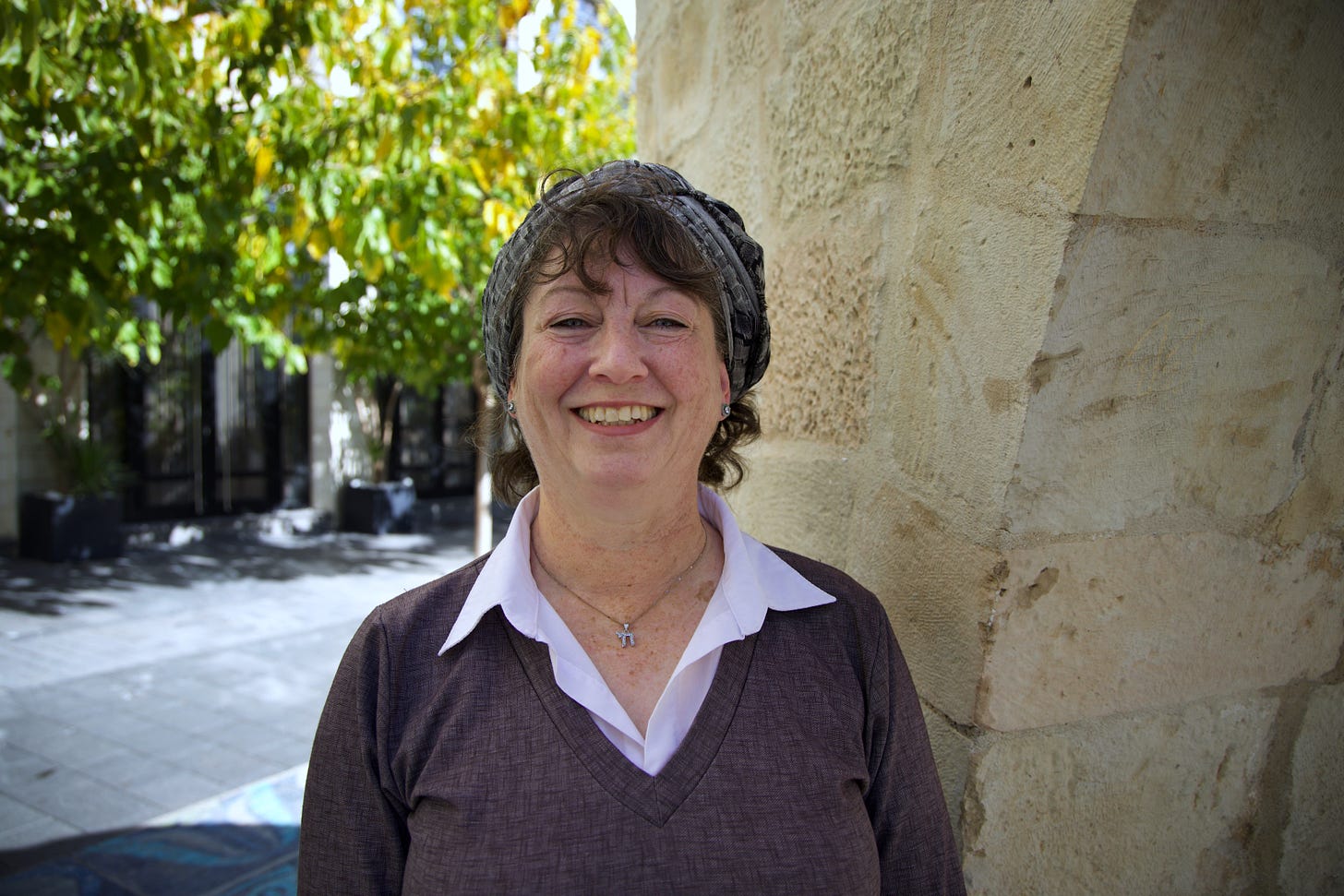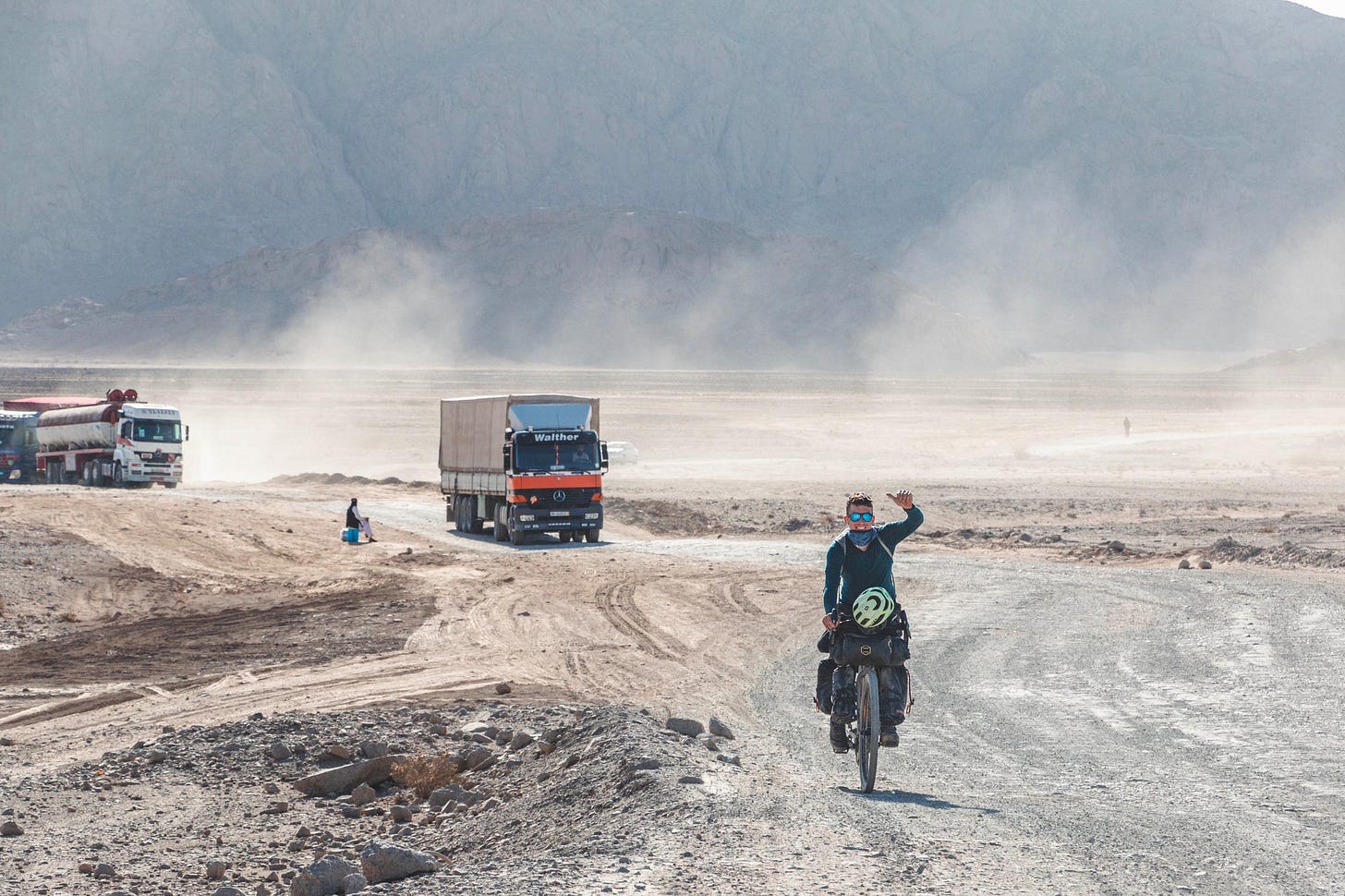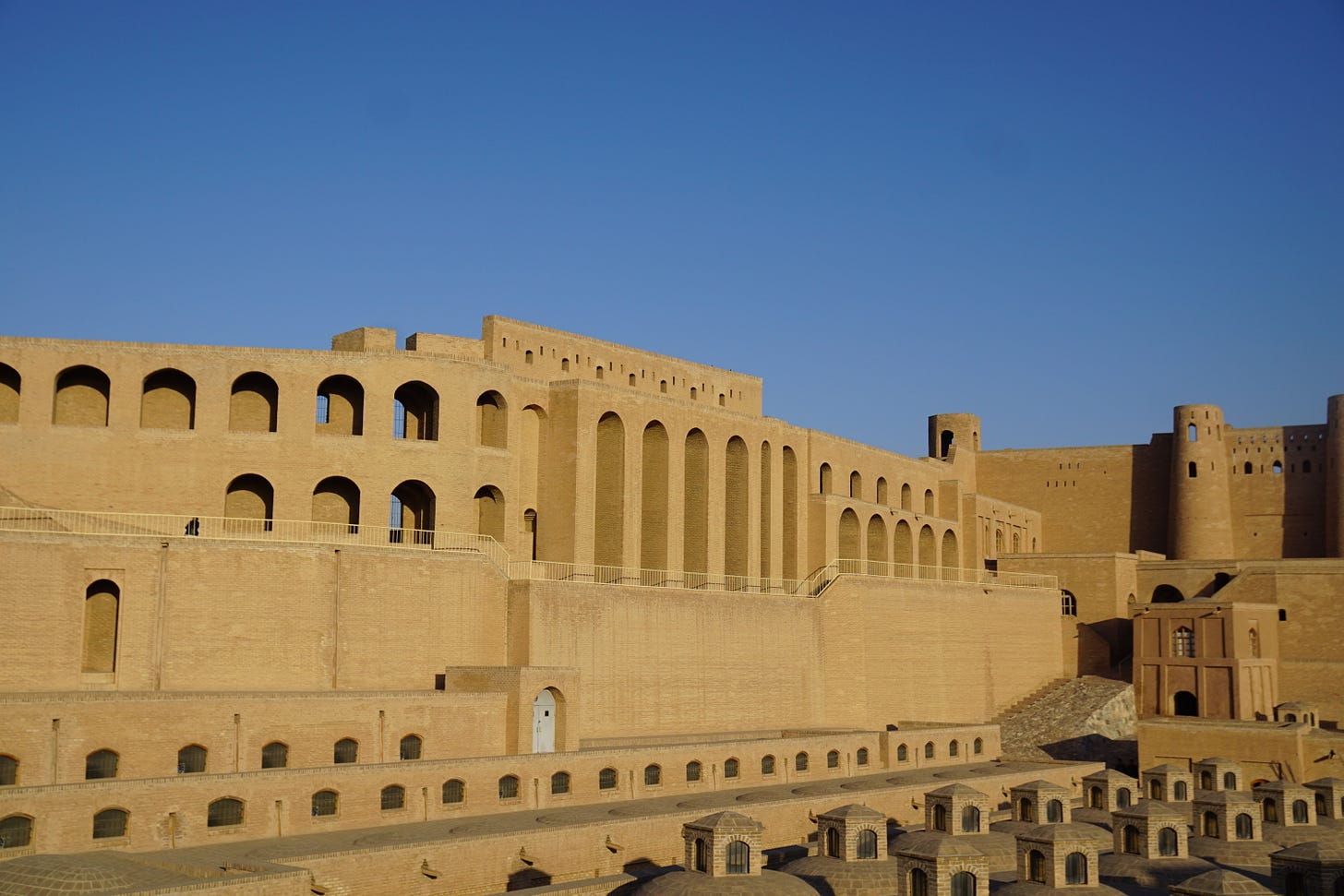The American settlers // Cycling across Afghanistan
Hello
While in Jerusalem, I spent some time with Naomi Kahn, an international spokesperson for Regavim, a pro-settler Israeli lobby group for an article for The Irish Times here (or you can read below).
Like a significant portion of settlers in the occupied West Bank, she holds American citizenship. As part of my reporting for my article about Regavim, I spoke with Dr Sara Yael Hirschorn, an historian who focuses on Israeli and Jewish history, and I read part of her book “City on a Hilltop”. It’s an interesting look at the many Jewish Americans who moved to settlements in the West Bank after the Israeli military occupation began in 1967. Many of these US citizens were active in the American civil rights movement and protested against the war in Vietnam. While settlers are typically viewed as right-wing now, many who came during the 60s - 80s identified as liberals, voted for Democrats in the US, and saw their move to the occupied West Bank as an extension of the fight for Jewish civil rights, according to Dr Hirschorn’s research.
You can read an article about how “How American citizens are leading rise of ‘settler violence’ on Palestinian land” that includes more comments by Dr Hirschorn here.
I’ve also been reading Rashid Khalidi’s “The Hundred Years’ War on Palestine” at the same time and it’s fascinating to read how the 1967 war was perceived among Arabs and Arab states (who had weak militaries that had little chance of standing up to the US-backed Israeli forces) and Jewish Americans who viewed the 1967 war as an existential fight for Israel that led many to forge a much deeper and more emotional link with the nascent Jewish state.
I also interviewed Kerry man Tomás Mac an t-Saoir while he was cycling across Afghanistan for an article about foreign tourism to the Taliban controlled country and also Joe Sheffer who runs Sarafat, a travel company which organises tours of Afghanistan. You can read the full article here or below.
Tomás was cycling through Afghanistan as part of extended cyling tour from India, through Pakistan and Afghanistan to Iran. It’s the reverse of the route taken by Irish traveller Dervla Murphy in 1961 which inspired her first travel book Full Tilt which is well worth a read.
Influential settler group criticises ‘illegal’ EU funding in West Bank and says two-state solution is Israel and Jordan
Regavim urges Israeli authorities to demolish Palestinian structures in Area C, where Israel has full control, but rights group B’Tselem says Regavim’s strategy is to create a misrepresentation that is the opposite of reality
At an upmarket cafe in west Jerusalem, Naomi Kahn (61) is fielding calls from the media, which have soared since the start of Israel’s war in Gaza.
The international director for Regavim, an influential pro-settlement lobby group, is criticising the Israeli military’s “selective” demolition of an outpost built illegally by Jewish settlers weeks beforehand in the occupied West Bank, near the boundary line with Israel. “This morning, there was a demolition of a Jewish school within one kilometre of dozens of illegal Arab structures that are being ignored,” says Kahn. The Israeli civil administration denied this claim.
Kahn believes Israel must maintain control of borderland areas inside the West Bank, “or the next massacre of Israeli civilians is only a matter of time”.
Like some 160,000 settlers living in occupied Palestinian territory, Kahn was born in the US. “We have a phrase there that ‘good fences make good neighbours’,” she says with a smile. A graduate of political science and near eastern languages from New York University, Kahn once campaigned for “liberal Democrats” and worked for a civil rights organisation in Washington.
Then, in 1984, she moved with her husband to a fledgling settlement east of Jerusalem. “Many American settlers were Democratic voters and active in ‘60s and ‘70s social movements in the USA prior to their immigration to Israel,” says Sara Yael Hirschhorn, a historian specialising in Israeli and Jewish history. “They felt they were often continuing their activism, now for ‘Jewish civil and human rights’ in the Occupied Territories, rather than seeing their political [transition] from left to right as a rupture.”
Kahn’s activism is now channelled into Regavim. The organisation was founded by Israel’s hard-right finance minister Bezalel Smotrich and has for almost two decades meticulously recorded West Bank construction through aerial footage and site visits, while lobbying the Israeli authorities to demolish Palestinian structures in Area C, where Israel has full control, including over planning.
“This surveillance and persecution prevented the Palestinians from naturally expanding their lands in Area C,” says Muhammad Mattar (46), the director of the central West Bank directorate of the Wall and Settlement Resistance Commission. These restrictions, he adds, have led to vertical construction, overcrowding and high property prices in Areas A and B of the West Bank, where the semi-autonomous Palestinian Authority has more control.
The Israeli civil administration for Occupied Palestinian Territories did not respond to a request for comment but, according to its own statistics, 90-95 per cent of Palestinian building applications in Area C are rejected, compared with 30-40 per cent of Israeli applications, while between 2022 and the first half of 2023, 770 Palestinian buildings were demolished in Area C, compared with 88 buildings constructed by Israeli settlers.
The settlements are illegal under international law and some of them are not even legal under Israeli law
— Dror Sadot, B’Tselem
Kahn says that “EU-funded Arab construction” is threatening to engulf Israel’s “security buffer” in Area C, where Regavim has supported legal action to demolish schools funded by the West Bank Protection Consortium, an alliance of NGOs and states including Ireland that supports Palestinian communities at risk of displacement. The consortium’s members have sought more than €1 million in compensation from Israel for projects damaged or demolished since 2015.
Kahn counters that Israel should demand compensation for “environmental damage” and “the costs of demolition”, and that if European governments understood that aid for Area C projects was “going down the drain”, then they might cease funding. The EU representative’s office did not respond to a request for comment.
“Regavim’s strategy is to create a misrepresentation that is the opposite of reality,” says Dror Sadot, a spokeswoman for the Israeli human rights NGO B’Tselem. “The settlements are illegal under international law and some of them are not even legal under Israeli law, whereas, the Palestinians live on their land, most of them in villages that were established even before the occupation [in 1967], and sometimes before Israel was established.”
After several hundred Palestinians were forcibly displaced from their homes in the West Bank due to rising settler violence and demolition orders, according to the UN, Kahn conducted press tours to deserted hamlets in Masafer Yatta in November. These included Khirbet Zanuta, where Kahn said the Bedouin community had been illegally squatting and were not permanently based, echoing a Regavim paper on “the myth” of Bedouin villages.
Learn more
She suggested the community had, in fact, voluntarily left for nearby grazing land. When this reporter visited Khirbet Zanuta in October, as its residents were packing up to leave, Amin al-Hudarat (41) said he had lived there his whole life but the threat of violence from settlers had become too high. “My son is sad to leave but we’re leaving for him,” he said.
“The state encourages this behaviour of the settlers – it finances the settlements, guards them with the army, and grants immunity to violent settlers,” says Sadot. Aspokesperson at the Ministry of Foreign Affairs responded that Israel is “a state of law” and that “anyone who breaks the law will be held responsible in the judicial system”. Kahn criticised B’Tselem’s narrative for undermining “the moral underpinnings” of the Israeli military and described proposals by the EU to ban violent settlers as “politically motivated” and “ridiculous”, given Israel’s “anti-violence” programmes – one of which has had funding cut by right-wing minister for national security Itamar Ben Giver due to “left-wing” affiliations.
In the long term, Kahn believes that Area C – making up some 60 per cent of Palestinian territory in the West Bank – should be formally annexed by Israel, and that “20 years down the line, there should be thriving Jewish communities throughout Area C”. Some Palestinians living there could be offered Israeli citizenship, like Israeli Arabs, she said – “and if you don’t want to be in Israel, then renounce your citizenship and move somewhere else”.
Kahn says that Areas A and B could become federalised zones under the control of Jordan, which signed a peace treaty in 1994 with Israel that expressly precludes the “involuntary” mass transfer of Palestinians to its territory. King Abdullah II of Jordan has said the Palestinian-Israeli conflict “must be resolved on the basis of a two-state solution” and that the West Bank and Gaza “are an extension of the Palestinian state”. Kahn, however, maintains that “the two-state solution is Israel and Jordan”.
Taliban says Afghanistan the ‘best place for tourists now’
Many countries, including Ireland, advise against travel to the impoverished region
Taliban-controlled Afghanistan was not part of the route that Tomás Mac an t-Saoir (29) had planned when he began a three-month cycling trip in India last November. But some seasoned travellers told Mac an t-Saoir that despite the militant and deeply conservative Taliban sweeping back to power in 2021, neighbouring Afghanistan was safe for foreigners “even on a bicycle”.
Before new year, the Kerry native paid $100 for a tourist visa, “no questions asked”, at the Afghan consulate in Peshawar in western Pakistan. A police escort then followed him along the mountainous Khyber Pass to the Torkham crossing that leads to Afghanistan. “At times in life, you just have to roll the dice and hope for the best outcome,” wrote Mac an t-Saoir in a WhatsApp message after crossing safely into Iran after four weeks of cycling the breadth of Afghanistan.
European countries including Ireland strongly advise against travel to the impoverished central Asian country where the Islamic State terror group continues to launch lethal attacks against Shia minorities and the Taliban. Several foreigners have also been detained by the Taliban including one Irish citizen in 2022. Last October four British citizens including Miles Routledge, a 23-year-old “danger tourist” and YouTuber, were released after several months of Taliban detention. Two of the men required hospitalisation for health conditions that had deteriorated while they were detained.
Despite stark warnings and difficulties with obtaining travel insurance, more than 2,000 tourists visited Afghanistan in November, according to the Afghan national statistics bureau. Several tour companies also operate organised trips.
Joe Sheffer, the British founder of travel company Sarafat, which offers trips to Afghanistan ranging from three to four nights to two weeks, says the security situation there rapidly improved once the Taliban retook control in 2021. Sheffer brings small groups of visitors to Helmand, where British troops were once concentrated as part of a Nato force supporting the then Afghan government against the Taliban insurgency. Helmand is familiar to the UK public because so many British soldiers died there, says Sheffer, who previously worked in Afghanistan as a journalist. He believes that bringing British people “without military uniforms” to meet locals in Helmand is beneficial for postwar Afghanistan.
Sheffer also arranges home stays with communities, providing an income boost of $150 (€138) for households amid dismal economic conditions. Sheffer estimates the wealthier households earn about $1,100 annually. Figures from the World Bank show the economy has contracted by 25 per cent since the Taliban’s return and Western states imposed economic sanctions. The agriculture, industry and services sectors are in decline, with deflation now further shrinking the fragile economy.
Foreign visitors in Afghanistan are closely monitored by the Taliban’s general directorate of intelligence, which has extensive networks reaching into rural towns and villages. While foreign women tourists have been granted significantly more freedom in the country than Afghan women and girls, they are required to wear a hijab and sometimes to be accompanied by a man in public. Some NGOs and activists have criticised foreign tourism to Afghanistan and online influencers sharing convivial images with the Taliban while Afghan women and journalists face violence and oppression.
But tourism is seen as one possible way for Afghanistan to attract much-needed foreign currency. During a visit to a 3,000-year-old fort in Helmand earlier this month, the acting Taliban minister of information and culture, Alhaj Mullah Khairullah Khairkhwa, said: “Afghanistan is the best place for tourists now” and that the ministry is trying “to solve the problems of tourists so that they can visit every part of Afghanistan in a good way”. Despite billions of dollars of aid and investment during the US occupation, the country’s infrastructure remains poor and underdeveloped. Mac an t-Saoir describes the highway he cycled on between the Afghan cities of Herat, Kandahar and Kabul as in “a terrible state”.
During his Helmand visit, Khairkhwa also announced that the Taliban had plans to restore historic sites in Afghanistan; while last September culture and arts minister Atiqullah Azizi said he hoped to secure Unesco world heritage status for Herat, a western city with some of Afghanistan’s finest examples of medieval Islamic architecture. The Taliban’s public vows to preserve Afghan heritage and overtures to tourists are a sharp contrast to the previous Taliban regime, which reigned before 2001 and blew up some of the world’s oldest and largest standing Buddhas, which were carved in cliffs edging the Bamiyan valley.
Hiromi Yasui, the Japanese owner of Hotel Silkroad in Bamiyan, welcomed two tour groups from Hong Kong and Taiwan to the scenic valley lying in the Hindu Kush last year, but overall business is slow and she’s not convinced that the Taliban seriously want to attract foreign tourists. ”“The situation in Afghanistan is very fragile,” says Yasui. “No one knows what will happen next.”







